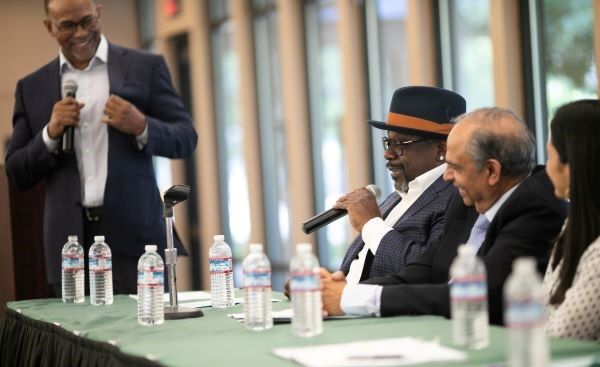 Sacramento City Councilman Allen Warren, left, interacts with Cedric the Entertainer (in hat) during a well-attended forum on race and its social impact. (Sacramento Stte/Andrea Price)
Sacramento City Councilman Allen Warren, left, interacts with Cedric the Entertainer (in hat) during a well-attended forum on race and its social impact. (Sacramento Stte/Andrea Price)Gabby Trejo’s relatives from Mexico advised her to “marry a white man” if she wanted to succeed in the world.
During desegregation efforts in San Francisco in the 1970s, Matt Ball hid inside his locker in fear of black students who were angry about being bused to his school.
Cedric Kyles “learned that we were inferior” growing up in a small town in Missouri, where for part of his childhood the local steak house refused to serve black people.
The three panelists and others shared their personal stories on Thursday evening at Sacramento State during a frank community discussion about race and its social impact.
The forum, at the Leslie and Anita Harper Alumni Center, attracted about 300 people. It was part of an effort by Sacramento City Councilman Allen Warren and Sac State's Task Force on Race, Immigration and Social Justice to improve dialogue about race relations.
The event featured Trejo, a civil-rights activist representing Sacramento Area Congregations Together; Ball, director of public affairs for the Church of Jesus Christ of Latter-Day Saints; Kyles, an actor and comedian otherwise known as Cedric the Entertainer; Jaswant Bains, an immigrant from India and a prominent Sacramento businessman; and actor and political activist Danny Glover. Later, a panel of Sac State students joined in the discussion.
“This is about making Sac State a better place, and making the world a better place,” said University President Robert S. Nelsen. “We need to have these conversations.”
Nelsen said he hoped the messages delivered Thursday would be unflinchingly honest, “where you come out and call bigotry bigotry, call racism racism, and call anti-Semitism anti-Semitism.”
The issues have been prominent on campus recently. Many black students reacted with anger and disappointment in March when Sacramento police officers were cleared in the killing of an unarmed African American man, Stephon Clark, last year. Recently, Nelsen condemned an anti-Semitic message anonymously scrawled on a light pole on campus.
Participants in Thursday’s event said discussion of race and bigotry and their impacts on society are keys to understanding the past and moving toward full equality for people of all backgrounds and cultures.
“I kind of see discrimination as ignorance,” said Bains. “Education is the biggest component” of fostering understanding and tolerance, he said.
Bains and other panelists talked about their personal perceptions and experiences around race, which Warren said continues to be “a divider” in society. Fear of other races and cultures spawns discrimination, said Glover.
“We have to talk about our implicit biases,” said Trejo. Stereotypes such as “Mexicans are lazy, or take our jobs, or have dirty houses,” or that young black men are dangerous remain pervasive, she said. “We have to have some real, meaningful conversations to come out of this transformed.”
Kyles added a dose of optimism to the conversation.
“There are places like this, where diversity and inclusion are respected,” he said of Sac State.
And ultimately, Kyles said, “we are humans first.”
“If there is a tragedy, a flood, an accident, a disaster, we just go and help,” he said. “We don’t think to ask whether it’s a white or a black person who is in trouble. We help. Then, unfortunately, we all go back to our corners.” – Cynthia Hubert
